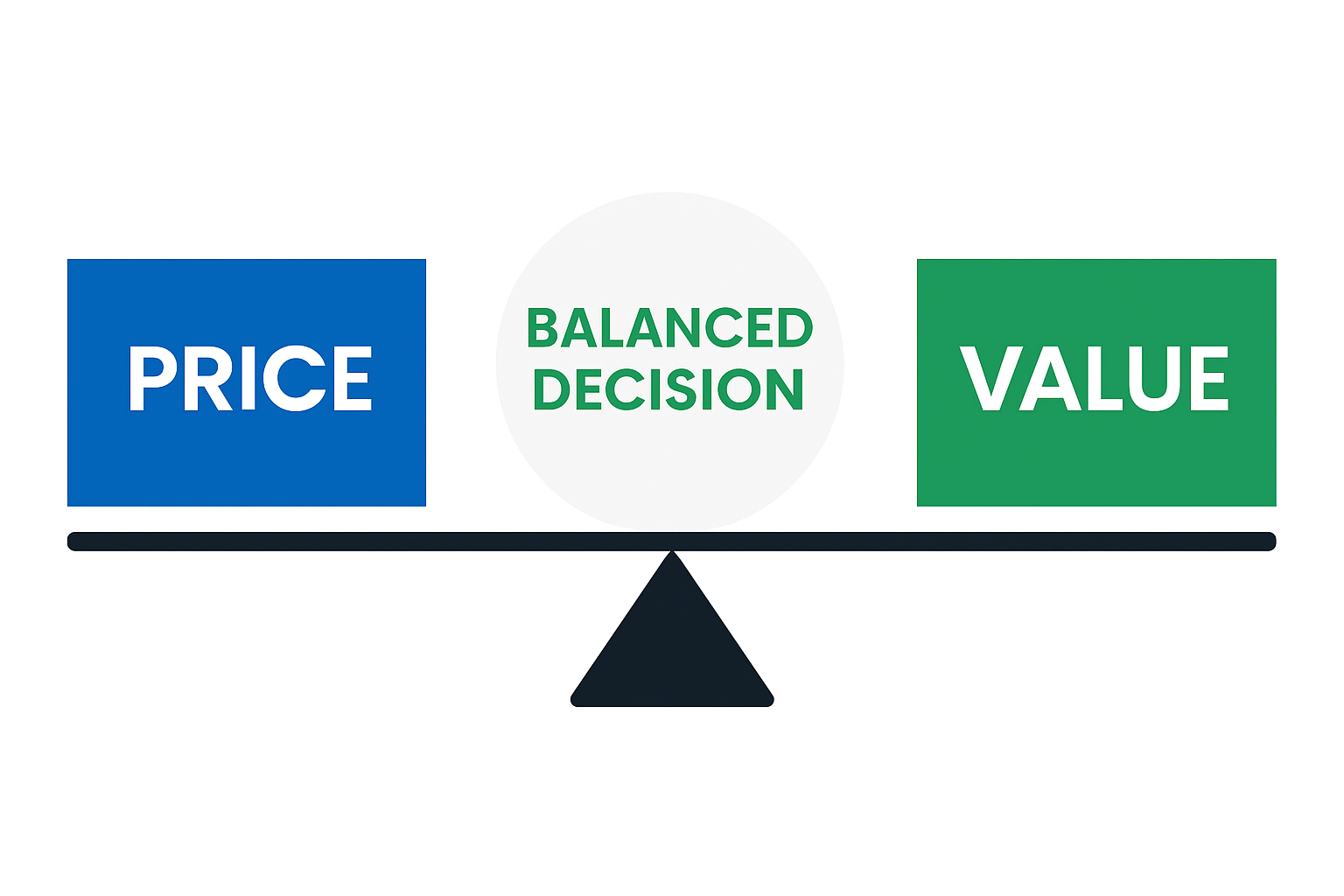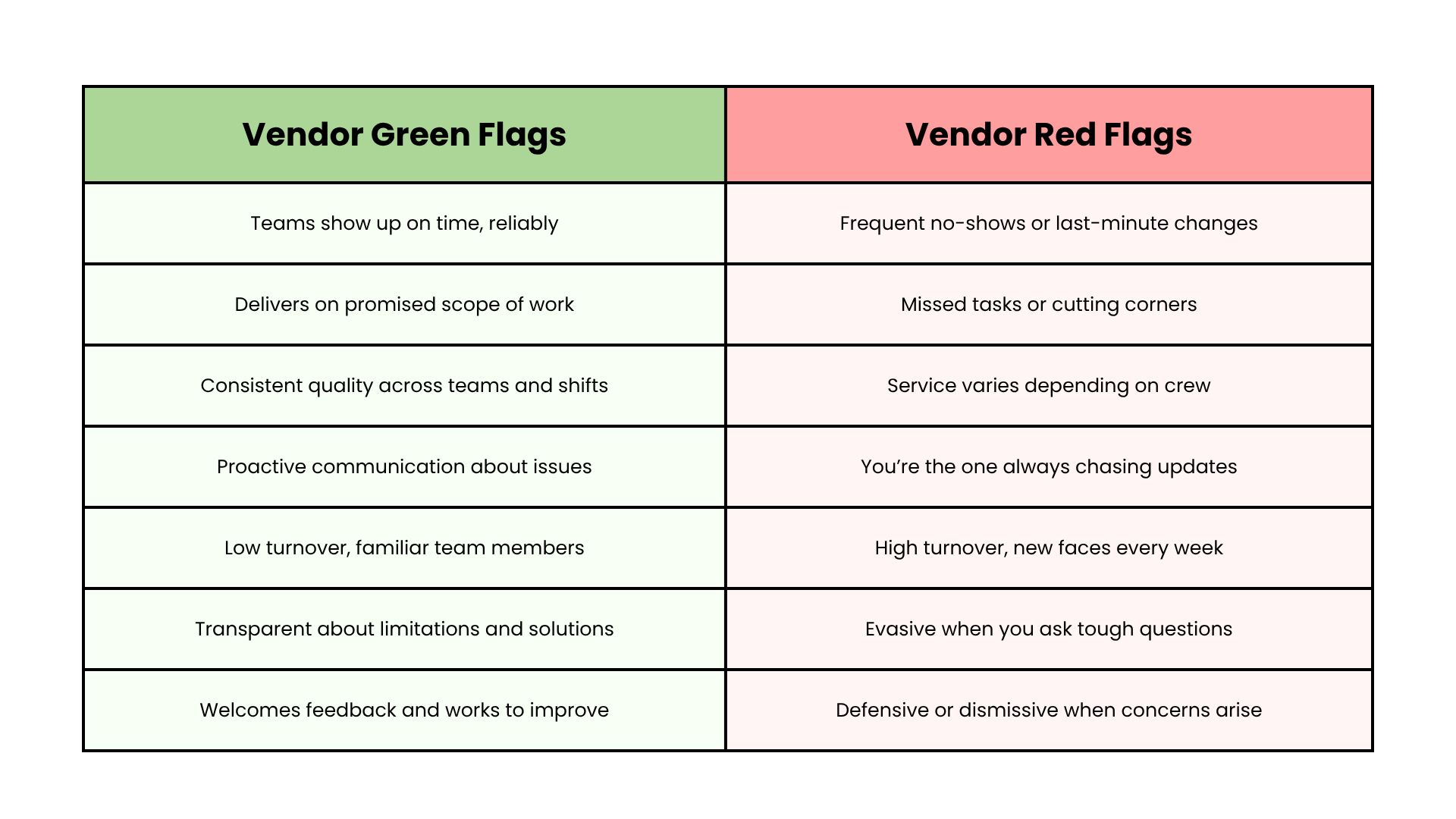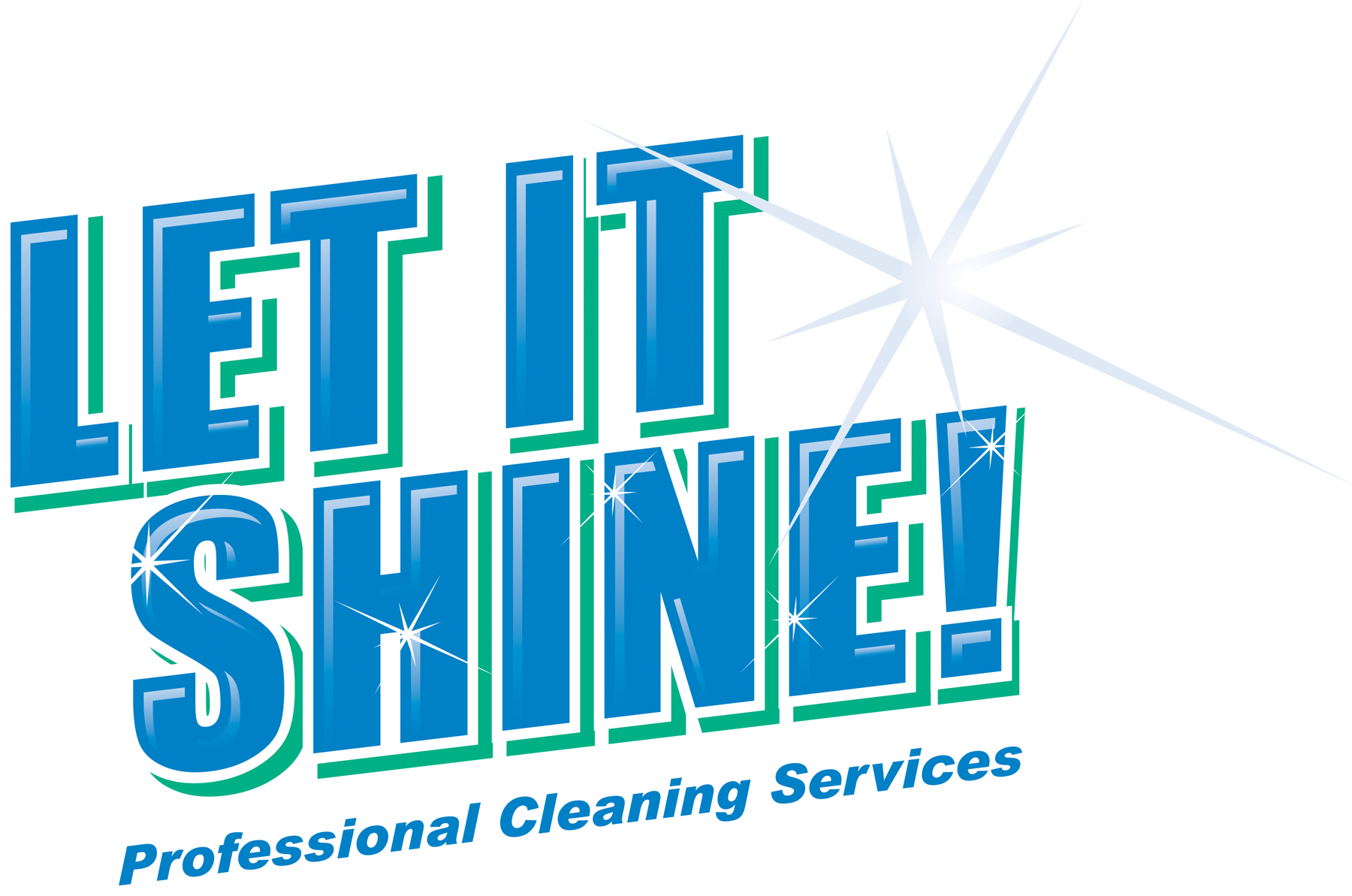If you are a facility manager and find yourself needing to hire for commercial cleaning services, it’s likely something has gone wrong and there have been pain points and frustration that have delivered you here. Often it can be poor quality, reliability, and/or customer service. At some point, enough is enough. You need to make a change, so you solicit proposals.
You meet potential vendors, do walkthroughs, and review fancy proposals. Now it’s time to decide and for most, price is the largest factor weighed. Sure, your budget matters. You are responsible for that line item. You need to stay in budget, or beat it. But, is there more to consider? We suggest you look for nuance, fit, and feel, then negotiate price. Because, when it comes to keeping your building reliably clean, safe, and running smoothly, you’re not just buying tasks — you’re looking for value and investing in a partnership.
In this post, we’re breaking down the three stages every facility manager goes through when hiring and managing a cleaning vendor. We’ll share tips to help you weigh price against value, set the right expectations, and build a relationship that lasts.
Stage 1: Proposal Phase — Price vs. Value
Most facility managers start by gathering quotes. And we get it — when you have a stack of proposals on your desk, it’s natural to look at price first.
But here’s where things can tip out of balance:
- One vendor comes in with a no frills rock-bottom price that will immediately work for your budget needs.
- Another includes a narrative of their behemoth size and national footprint and promises of a District Manager who will provide regular quality checks, better-trained staff, and specialized equipment. Their proposed price is in the middle, slightly above your target budget.
- A third offers verifiable local experience and qualified capabilities, answers your questions about reliability and responsiveness, and gives you confidence the relationship will be important, but at a price that is the highest of the 3 options.
Without digging deeper, it’s easy to assume the cheapest option is the “best deal.” But price only tells part of the story.
The key takeaway: A low price might cost you later — in missed cleanings, higher turnover, or more time spent managing problems. A higher price might come with real value — but only if it’s backed by service, transparency, and a commitment to your facility’s success. What do you do?
Negotiate! If you feel like Option 3 would be the best fit for your operational needs, price aside, negotiate the price. Give the vendor a chance to better understand your budget needs and improve their price. Be ready to give and take and you will have a chance to secure the services of a vendor who will be in it with you, as a true partner.
For a deeper dive into how value, cost, and price work together, check out this helpful guide from Indeed.
Why Price Isn’t the Whole Picture
It’s easy to think of price as the most concrete part of a cleaning proposal — after all, it’s the number printed at the bottom. But what that number actually reflects can vary widely between vendors.
Behind every price is a business model.
When you see a lower-than-average quote, it’s worth asking:
- Are they paying their teams fairly, or relying on low-wage, high-turnover labor?
- Do they invest in training, equipment, and supervision — or are they keeping overhead as low as possible?
- Are they skipping important services or details to undercut competitors?
On the flip side, when you see a higher-than-average quote, it’s fair to ask:
- What additional services or standards are included?
- Does the company have a track record of proactive communication and consistency?
- Are you paying for higher accountability, better quality control, or specialized expertise?
The key takeaway:
A low price might cost you later — in missed cleanings, higher turnover, or more time spent managing problems. A higher price might come with real value — but only if it’s backed by service, transparency, and a commitment to your facility’s success.
Before you choose, don’t just look at what you’re paying — look at what you’re actually buying.
Questions to Ask at This Stage:
✅ What’s included — and what’s not?
✅ Do you use commercial cleaning employees or subcontractors?
✅ How do you keep teams consistent and accountable?
✅ What’s your employee turnover rate?
✅ How do you onboard new clients and adapt to their needs?
✅ Can you explain where my money is going?
These questions help you compare proposals on more than price — they help you understand what kind of partner you’re hiring.
Facility Manager Tip: Watch for Clarity and Transparency during the Proposal/Vendor evaluation stage.
A good vendor will:
- Explain their pricing clearly and be willing to negotiate.
- Be upfront about limitations and challenges.
- Offer insight on what will drive the most value for your facility.
If a vendor seems evasive, vague, or overly confident or boastful, that’s a signal to slow down. You want a partner who’s willing to have honest, practical conversations — right from the start.

Stage 2: Early Execution — Service Meets Expectations
Once you’ve signed the contract, the first few months usually feel good. The vendor is eager to prove themselves, and you’re hopeful about the new partnership. This is often called the “honeymoon phase,” when both sides are on their best behavior.
But, late in Stage 2, say in 3 to 6 months, when the “newness” of the relationship begins to wear off, this is when the real test begins. You will start to notice that either your choice is feeling justified or begin to see signs of fall off or cracks in performance. Pay close attention during this critical period, give feedback and stay engaged. You may now have the makings of a terrific long-term partnership or be heading toward starting all over again.
What to Watch For:
- Is the team showing up reliably and on time?
Schedules matter — and consistent presence shows you’re a priority, not just another account. - Are they delivering on the services they promised?
It’s not just about cleaning the floors — it’s about meeting the full scope of work you agreed on. - Is the quality consistent?
Does the service level stay steady across shifts, or does it vary depending on who’s on duty? - Do you notice missed details or rushed work?
Are trash cans skipped? Are restrooms less thorough? Small signs can signal larger issues.
The Hidden Patterns Behind Early Service
This phase reveals whether the vendor has:
- A strong internal training system and ethos of team support.
- Clear supervision and culture of reliable service and accountability.
- A commitment to deliver for you over the long term.
If you start to notice cracks — like inconsistent crews, rushed work, or missed areas — it may not be the crew’s fault. Sometimes, when vendors take on low-margin contracts, their cleaners may not be allowed to take the time necessary to complete the tasks you thought you agreed on upfront. Occasional human error should be expected, but a large drop off in performance is a major red flag that reveals the company’s values and likely will lead to an unrepairable end to the relationship.
Facility Manager Tip: Talk Early, Not Late
If you spot issues, don’t wait until the six-month review to bring them up.
Here’s why:
- Good vendors should always monitor their own performance but are also open to hearing from you and how you think things are going from your perspective.
- Small adjustments early can prevent bigger problems later. If the vendor makes a small course correction early and you notice the issue does not recur, they are accountable and listening to your needs.
- Addressing concerns promptly helps you understand if the vendor is truly responsive — or if they’re not set up to improve.
Remember, this phase is not just about inspecting performance — it’s about testing communication and trust.
To help you quickly spot which direction your vendor relationship is headed, here’s a practical checklist of green flags and red flags we see most often in the field.

Stage 3: Relationship Phase — Long-Term Balance
Real value doesn’t show up in the first few weeks. It shows up over time.
This is the phase where you and your cleaning partner figure each other out — and hopefully, settle into a groove that works.
What a Strong Vendor Relationship Looks Like:
- You understand why you’re paying what you’re paying.
- The vendor understands your priorities and adapts as things change.
- Communication is proactive — you don’t have to chase them for updates.
- Trust builds on both sides.
At Let It Shine, many of our longest-standing clients started with one or two buildings. Over time, as we proved ourselves, those relationships expanded. That’s when a commercial cleaning vendor stops being just a contractor — and becomes part of your facility’s success story.
Watch Out for This: Misaligned Expectations
One of the biggest pitfalls we see is when managers expect high-end service at low-end prices.
When that happens:
- The vendor feels squeezed and cuts corners.
- The manager gets frustrated and feels let down.
- The relationship falls apart, and you’re back to square one.
Tip for staying in balance:
Match your expectations to what you’re paying for. If you’re investing in premium service, hold your vendor to it. If you’re working within a lean budget, prioritize consistency at that level — not extras they can’t realistically provide.
Quick Checklist: Comparing Commercial Cleaning Quotes
✅ Look beyond the hourly rate
Ask what’s included, what’s not, and how each proposal stacks up.
✅ Understand the staffing model
Are workers background-checked, trained, and paid fairly?
✅ Think about long-term value, not just short-term cost
Low prices today can mean higher costs later if turnover or quality issues crop up.
✅ Ask about communication and accountability
Who do you call if there’s a problem? How do they handle service concerns?
The Bottom Line: Price Is Easy. Value Takes Time.
Price is the first thing you see. But value — dependable, consistent, long-term value — is something you only learn over time.
If you’re a facility manager looking for commercial cleaning services, approach it like a three-stage process:
- Compare price and value fairly.
- Watch for alignment between service and expectations.
- Build toward a relationship that works for everyone.
Ready for a Cleaning Partner Who Balances Price and Value?
If you’re ready for a cleaning partner who understands the balance between cost, quality, and long-term value, Let It Shine is here to help. We’re proud to support facility managers across Northern Colorado with plans that work — and keep working

